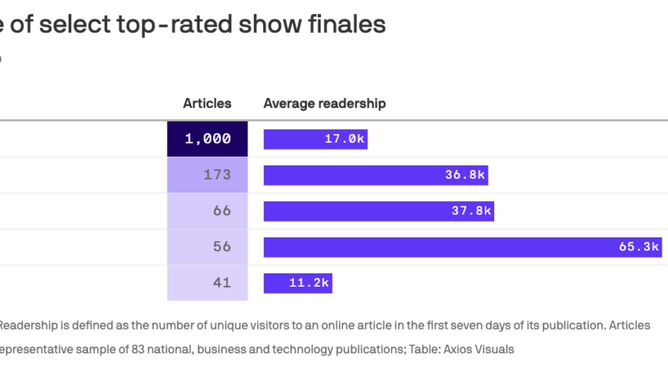Media Love Affair With 'Succession' Was Disproportionate With Public Interest
A new study finds Succession was more media darling than a monoculture phenomenon.
Coverage of Succession was plastered across the internet for its 4th and final season -- including here at OutKick.
Sites covered the show like a football season, a weekly event that garnered previews, predictions, post-show podcasts, and in-depth breakdowns.
But was Succession worthy of such coverage? Did the popularity fit the hype?
Axios research says no. The study uncovered that media coverage of the show was disproportionate to reader interest.
A subsequent chart compared the coverage vs. interest of Succession to other major TV series whose season finales occurred in the last month.
Succession drew as much as 17 times more articles than series like Young Sheldon, and about 4 times fewer readers:

Now, Sheldon, NCIS, and Chicago Fire each aired on broadcast networks, CBS and NBC. Succession aired on HBO, a premium and streaming service.
HBO is available to far fewer homes than the others. And availability is a factor in readership.
That said, the ratio of articles and readers is quite telling. If nothing else, Succession wasn't the mainstream happening its coverage suggested.
In fact, OutKick first questioned its popularity following its finale last month. The finale episode of Succession drew 2.9 million viewers, a series record. HBO spun the number as a cinematic achievement. Though it was anything but.
HBO positioned the series as its flagship. Yet compared to the previous flagship, Game of Thrones, Succession was a substantial downgrade in popularity.
By comparison, the Thrones series finale set an HBO record of 19.3 million viewers in 2019.
Sure, there's only one Game of Thrones. No show could replace its cultural influence that soon. Still, Succession failed to compete even with the Thrones spinoff House of the Dragon, which drew 9.3 million viewers for its season finale last October.
And unlike Succession, several supposedly influential critics oft panned Dragon.
One can also measure a show's success by total reach, including those who stream and view episodes days and even weeks later. Note, the viewership above represents only the first 24 hours.
But that metric also found Succession non-competitive with other HBO tentpoles. Succession averaged 9 million using the totality metric. Dragon and HBO's The Last of Us averaged 30 million viewers per episode just months before.
HBO's White Lotus concluded its second season in December, averaging 15.5 million viewers per episode.
In 2022, Euphoria drew 19.5 million viewers.
Thereby the New York Times, a fan favorite of Succession, concluded the series remained "niche" despite its later season gains.
Critical acclaim and accolades, both of which Succession can stack its shelves with, do not correlate with consumer interest. That's never been more accurate than today.
Notably, Paramount's Yellowstone has never received a positive review or award from legacy media. And yet it was the only non-sports title to draw more than 11 million viewers (in a 24-hour span) a night this past year.
Perhaps lo-cal can best describe the dichotomy between media and fans. A Wall Street Journal review found that 73 percent of Succession viewers reside in A markets such as L.A. and New York. The show barely registered in D markets, also known as middle America.
Meanwhile, viewership of Yellowstone is evenly distributed, with A and D markets both accounting for 28 percent.
See, most film critics and journalists live in L.A. or New York. They often appear unbeknownst that a country exists elsewhere. That's true in coverage of politics, culture, sports, and television.
Snotty, entitled, media mogul children born on third base don't resonate with blue-collar workers, one could deduce from the metrics.
Snotty, entitled, ranch-living children born on third base do.
Critically, Succession was the most acclaimed show of the 2020s. To society, it was just another binge or not binge option on the dial. And most chose not to binge.
Succession was a success. Just not nearly to the degree the media portrayed.